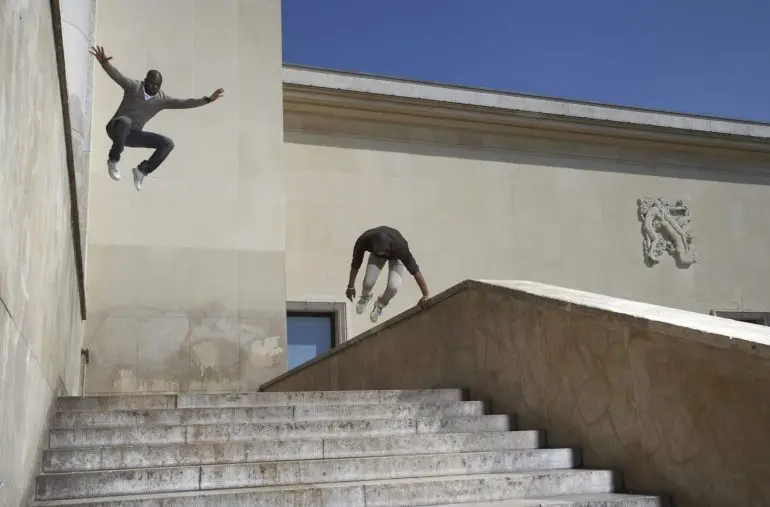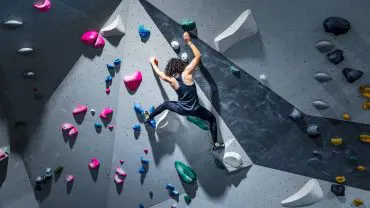What is Parkour? It might surprise you to learn that you’ve probably already seen it in action. Take the opening scene of blockbuster movie Casino Royale, where parkour veteran Sebastian Foucan shows some of his incredible moves while fleeing James Bond. But we won’t leave you hanging with just that explanation.
Developed in the 1980s, parkour is based on the principle of using one’s body to move through one’s environment as efficiently as possible. But what does parkour mean in practice? What is the sport of parkour? And how does that differ from the philosophy? We’ll explore all this, beginning with the origins of parkour before diving deep into the practices and principles of this increasingly popular activity.
And if all that makes you want to try it out, we’ll also answer, what do you need for parkour?
What Does Parkour Mean? The Origins Of Parkour

Man jumping over buildings against sky (Photo: Cavan Images via Getty Images)
It was a group of young Parisians calling themselves the ‘Yamakasi’ who are believed to have created parkour in the 1980s.
Usually attributed to the leadership of a man called David Belle, they are said to have been inspired by the training practices of the French Special Forces known as “Parcours du Combattant” or “Path of the Warrior.” In terms of “what does parkour mean”, it’s just the French word for “path” except with a “k” instead of the “c”.
So, what does parkour mean in practice? How is it done? In other words, what is the sport parkour?
What is the Sport Parkour?

Jumping high on steps (Photo: Matt Henry Gunther via Getty Images)
So, what is the sport parkour all about? Essentially, it’s an urban athletic sport based on military assault course training. It provides parkour athletes or “traceurs” with a toolbox of movements to navigate through environments, getting from point to point as efficiently as possible.
Running, vaulting, swinging and climbing are just some of the possible moves in this repertoire. A central aspect of parkour is the challenge of negotiating obstacles, whether by going over, under or through them gracefully and deftly.
Three central principles of parkour are efficiency, safety and precision. Efficiency is all about taking the shortest, quickest route possible to get from A to B. Safety alludes to the idea that traceurs must always be aware of their surroundings and take precautions to avoid injury. And precision means clarity and accuracy in one’s movements and jumps.
Just like other sports, there are national and international competitions for parkour, including the World Parkour Championships. Competitors can be judged according to speed, style, skill or a combination of the three.
What is Parkour v What Is Freerunning?

Man performing parkour against brick wall with urban underpass (Photo: Mike Harrington via Getty Images)
Is the answer to “what is parkour” the same as that of “what is freerunning”? Sort of.
Parkour is often conflated with freerunning and, in some ways, the two are interchangeable. In fact, freerunning was the original English version of the practice’s name. However, over time, there developed two schools of thought with regard to parkour. There were those, David Belle among them, who continued to see it as the practice of getting from one point to another as efficiently as possible. Then there was a group, usually attributed to the leadership of Sebastian Foucan, who saw it more as an artform or mode of expression. Freerunning became the term for these more creative aspects, such as tricks and flourishes, but is still considered parkour.
Nevertheless, it is for this reason that the answer to “what is parkour” elicits myriad responses. Parkour is described on one hand as an artform, a discipline and even a philosophy. It’s often called the “art of movement” and seen as a mode of uninhibited self-expression. On the other hand, it is a sport and, whilst usually uncompetitive, there are competitions out there.
What is Parkour good at Developing?

A parkour enthusiast jumps over a city fence (Photo: JuiceBros via Getty Images)
Parkour’s fans claim that the sport is not only great exercise, but that, performed correctly, it can help improve everything from posture to self-discipline.
It is also credited with enhancing agility, mobility, coordination, balance and strength.
What do you need for Parkour?

Free running parkour athlete in the beach (Photo: Tempura via Getty Images)
The answer to “what do you need for parkour” is, well, not very much actually. That’s one of the great things about it. Ideally, traceurs wear loose, comfortable clothing, but there’s no specific equipment or attire. Once you know the basics, parkour can be practised almost anywhere and with nothing more than a pair of sporty shoes with decent grip.
There is one caveat to this, mentioned above, and that’s knowing the basics. In terms of “what do you need for parkour”, an understanding of how to perform movements safely is vital to avoid injury. With the popularity of the sport on the rise, there are ever more classes, parkour gyms and local groups on offer through which to study it – and it should not be attempted without such instruction.
We’ve done it. We’ve negotiated the route from “what is parkour” to “what do you need for parkour” and hopefully achieved it as efficiently and as gracefully as possible.











